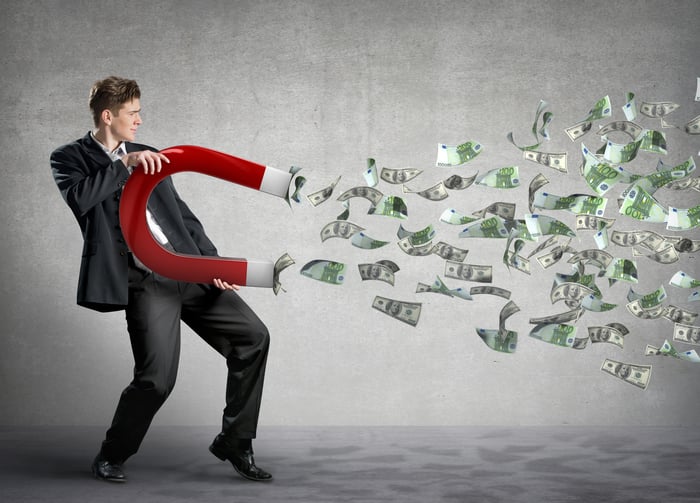A business model is how a company generates revenue and turns it into profit. However, some companies do a much better job at the latter because they have such amazing business models. Three of the best, in our opinion, are Intuitive Surgical (ISRG 2.21%), Disney (DIS 1.54%), and Phillips 66 Partners (PSXP). Here's why.
The epitome of the razor-and-blades business model
Sean Williams (Intuitive Surgical): When I think of companies that have truly amazing business models, robotic surgical device developer Intuitive Surgical comes to mind. The company's razor-and-blades model, along with its clear competitive advantage, puts it light-years ahead of its peers.

Image source: Getty Images.
According to the company's fourth-quarter earnings results, it had more than 3,900 of its proprietary da Vinci surgical systems installed worldwide as of the end of 2016. Comparatively, you could add up all of Intuitive Surgical's competitors and not come anywhere near the installed base of da Vinci's systems. It takes a lot of time to train surgeons and build up a relationship with the medical community that's needed to expand a network of robotically assisted surgical systems. This provides Intuitive Surgical with a clear competitive advantage that should last for years to come.
Perhaps even more impressive is that its razor-and-blades model provides better margins as the company grows. Initially, the average $1.5 million cost for the da Vinci system was the driving force behind the company's top-line growth. However, system margins are actually pretty low given that the cost to build its da Vinci platform have grown over time. The really juicy margins come from residual services and accessories (the "blades"). Because these systems are so pricey, and the training so rigorous, it's highly unlikely that Intuitive Surgical would see a hospital switch to a different system. This locks a medical facility in with Intuitive Surgical over the long run, providing bountiful accessories and service revenue that grows as its installed base increases in size. In its recently reported first quarter, the company reported 18% instrument and accessories growth and a 13% jump in service revenue.
On a more organic level, Intuitive Surgical has pretty sizable growth opportunities in overseas markets, as well as in expanding its focus into more generalized soft tissue surgeries.
With growth expectations that could easily top 10% annually for the foreseeable future, it's hard not to recognize a great business model when you see it.
Utilizing the power of great characters and stories
Keith Noonan (Disney): When it comes to creating synergies across business segments, few companies have a better track record than Disney. At the heart of the company's incredible success is a dedication to the power of great characters and storytelling. Take Mickey Mouse, for instance -- the character was created by cartoonists Walt Disney and Ub Iwerks in 1928 and has been a mainstay of popular culture ever since. Nearly 90 years after the character's debut in the Steamboat Willie cartoon, Mickey is still welcoming crowds to the company's theme parks and generating billions of dollars in annual retail merchandise sales.
That's just one example of the brilliance of the company's model at work. More recently, the company has relied on massive box-office hits that bridge revenue to the company's theme parks, consumer products business, and even its television networks. 2016 saw the company set a record for the biggest year in box-office history, and along with characters including Mickey and Minnie Mouse, big properties including Zootopia, The Jungle Book, Star Wars, and the Marvel Cinematic Universe helped propel retail sales of Disney-licensed merchandise to a record $57 billion in 2016.
Aside from lagging sales and rising costs at its ESPN network, the company has been on an incredible hot streak and continues to cement its reputation as the top company in entertainment. In fact, a recent study from Statista found that Disney ranked as the third-most reputable company in the world, and the company's incredible stable of entertainment franchises and great business model suggest the company will keep winning in the years to come.
Collecting tolls even on empty space
Matt DiLallo (Phillips 66 Partners): Pipeline and storage terminal operator Phillips 66 Partners has a pretty amazing business model, in my opinion. The company leases capacity on its pipelines and storage facilities under long-term contracts. As a result, it collects fees when volumes pass through or park at its assets, which makes it like a toll booth operator and parking attendant all rolled into one.
However, what takes its business model to the next level is that the company also typically locks in minimum volume guarantees from its customers. Because of that, it gets paid even if they aren't using their contracted capacity. For example, last year, the company spent $1.3 billion to buy 30 logistics assets from its parent company, Phillips 66 (PSX 1.14%). As part of the deal, the refining giant signed 10-year terminaling and throughput agreements with Phillips 66 Partners that included minimum volume commitments for 85% of the projected volumes across those assets. Because of that, Phillips 66 Partners has high confidence that it will collect about $150 million in annual cash flow over the next decade from these assets.
Since Phillips 66 Partners gets nearly all of its income from stable fees, which it further solidifies with minimum volume commitments, the company generates very steady income. That enables it to pay investors a very secure distribution, which currently yields 4.5%. Meanwhile, the company can leverage the stability of its business model to finance additional asset acquisitions, which grows its stable cash flow and ability to increase investor distributions. In fact, under its current plan, Phillips 66 Partners expects to increase its payout by a 30% compound annual growth rate through the end of next year. That's an incredible growth rate for such a stable company, which is all thanks to its ability to collect fees even if customers aren't using its network.





